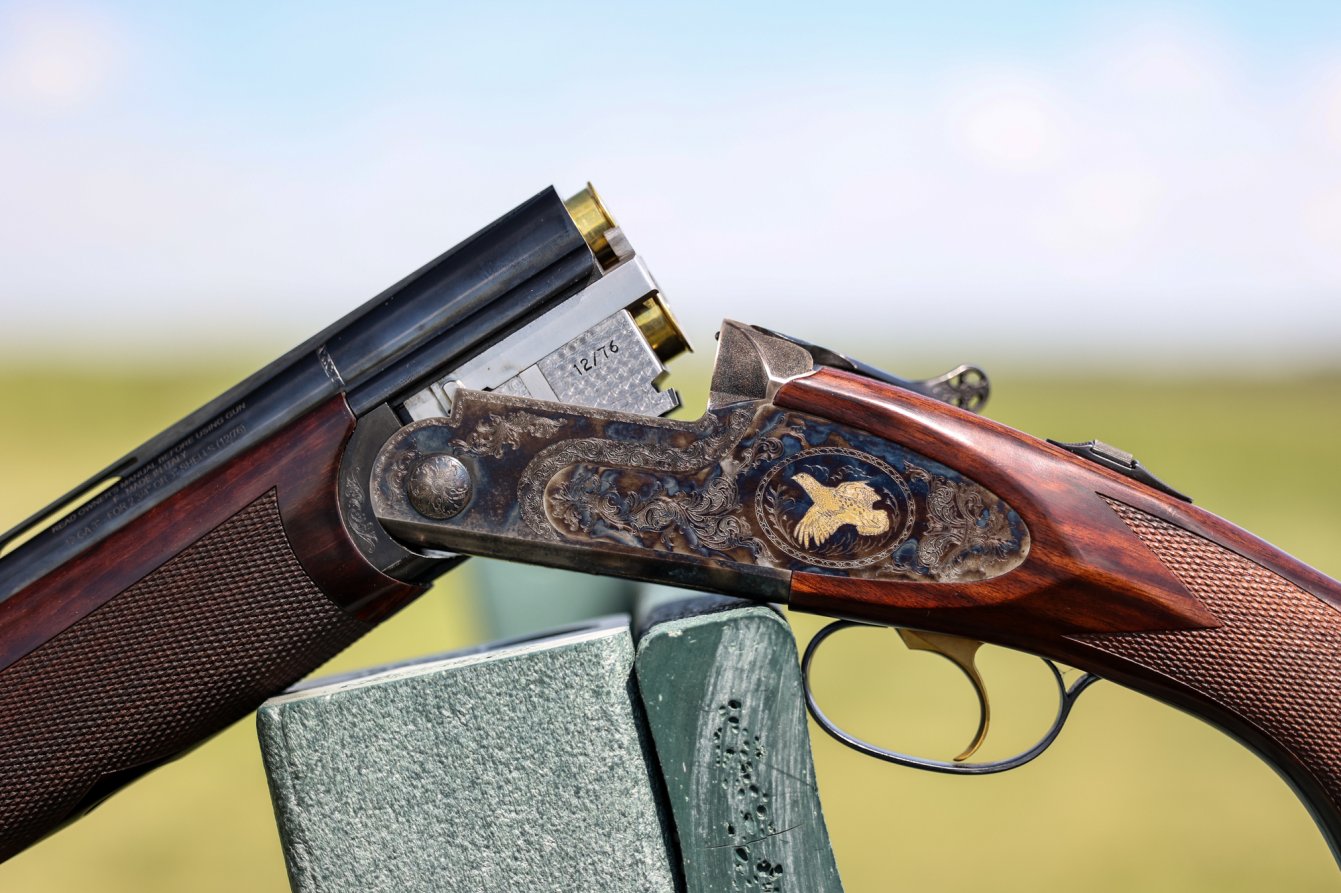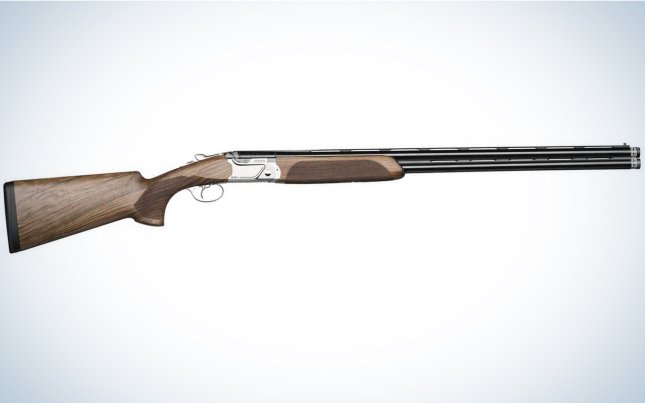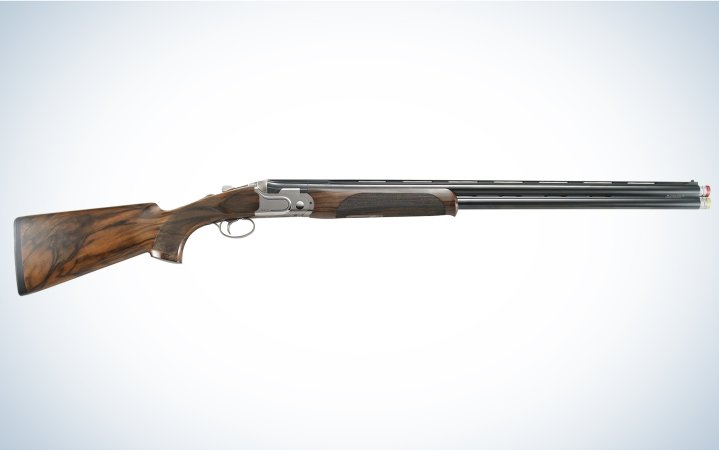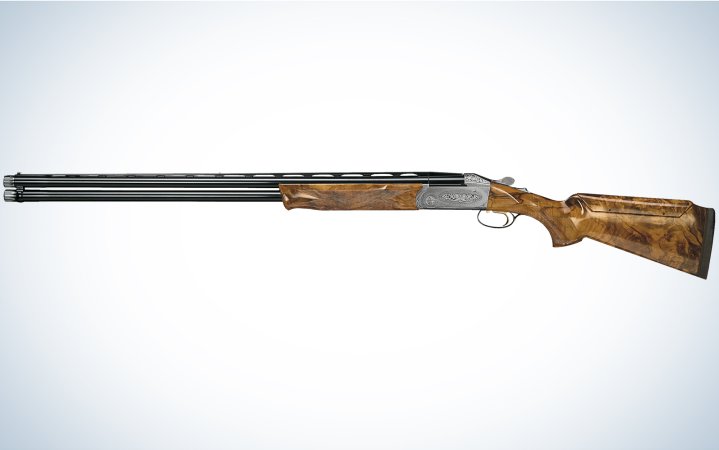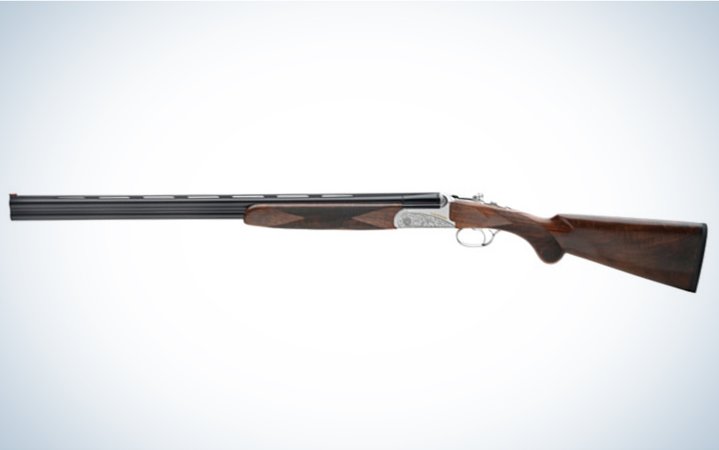We may earn revenue from the products available on this page and participate in affiliate programs. Learn More ›
The over/under shotgun is iconic in upland bird hunting fields across America. If you close your eyes and imagine yourself following a well-trained bird dog through an autumn field, there’s a good chance the shotgun you’re carrying in this daydream is a fine-looking over/under. But you’ll also find O/Us on clays ranges everywhere from the local club to the Olympics. It’s a proven platform that’s used to produce high-end competition guns and gorgeous field guns alike.
But you’re going to have to pay for that combination of beauty and performance. Even though a majority of modern O/Us are made by CNC machines, they are often more expensive than pumps or auto-loaders. The good news is there are a wide variety of O/Us at multiple price points. The best over/under shotguns are costly, but there are also inexpensive options that will get the job done all the same, just with a bit less style.
- Best Overall: Beretta DT11 Black
- Best Trap: Krieghoff K-80 Pro Sporter
- Best Skeet: Perazzi High Tech Skeet
- Best Sporting Clays: Beretta 694 Sporting
- Best Upland: Browning Citori Hunter Grade I
- Best Sub-gauge: Fausti Caledon
- Best Looking: Franchi Instinct Sideplate
- Best Value: Tristar Trinity
How I Picked the Best Over/Under Shotguns
I’ve shot all but one (Beretta’s DT11) of the guns in this list through my career as a hunter and a gun writer. I’ve also had the opportunity to interview some of America’s best shooters—namely Vincent Hancock, Kim Rhode, Zach Kienbaum, and Desi Edmonds—and I applied much of their expertise when picking the high-dollar clay sports shotguns. On the hunting side, I’ve spent a significant amount of time shooting less expensive O/Us. I have found that once the price of a break-action shotgun falls below $3,000 the pool of firearms deepens but there are only a few worth buying. Go below $1,000 and the number of quality guns shrinks even more, though Turkish gunmakers are doing well to close that gap.
In short, I have shot a lot of attainable O/Us, and found Browning and Fausti make the best. TriStar O/Us are a great value and one of the better introductory options on the market. All of the over/under shotguns on this list are still in production. There are a ton of excellent classic O/Us that are no longer being made, but that’s another list for another time.
Best Over/Under Shotguns: Reviews and Recommendations
Best Overall: Beretta DT11 Black
Best Overall
Beretta DT11 Black
Pros
- Beretta’s Steelium Pro barrels and Optima choke system deliver superior patterns
Cons
- Depending on your preference, the carbon-fiber rib may make the barrels too light, so you will have to make rib weight adjustments
Key Features
- Gauge: 12
- Action: Cross-bolt break-action
- Capacity: Two
- Chamber: 3-inch
- Barrel Type: Steelium Pro
- Barrel Length: 30 or 32 inches
- Chokes: Five Optima chokes (C, SK, IC, IM, M)
- Sights: Single white bead
- LOP: 14.37 inches
- Weight: 8.1 pounds
- Cost: $11,000

American skeet shooter Vincent Hancock has won a record three gold medals with Beretta shotguns, the last of which came while shooting the DT11 Black. And since it’s the shotgun of choice for the best skeet shooter of all time; it gets the nod as the best over/under shotgun. A carbon-fiber rib allows shooters to add length to the barrels without adding weight. Hancock used to shoot 28-inch barrels, but bumped up to 30s in the DT11. A longer barrel set can help keep your swing on track, and if you like more weight in the front of your over/under then you can use the included rib weights to find the proper balance. Beretta’s Steelium Pro barrels, used in the Italian gunmakers’ high-end double guns, come standard as do five Optima chokes.

DT stands for “detachable trigger.” You can drop the trigger out by opening the action, aligning the lever with the safety, pushing the safety forward to expose a black dot, and moving the lever to the right. Detachable triggers have crisper trigger pulls—the DT11 breaks at 3½ pounds—and it’s easier to clean and adjust trigger weight. The cross-bolt action of the DT11 is 3 mm wider than its predecessor, the DT10, giving it a stronger lock up so it can hold up even after tens of thousands of shotshell ignitions. Beretta offers a variety of different stocks for the DT11 so that shooters can experience a more custom fit.
Best for Trap: Krieghoff K-80 Pro Sporter
Best for Trap
Krieghoff K-80 Pro Sporter
Pros
- Assortment of custom fits and finishes (stocks, triggers, etc.)
Cons
- Shooters who rely on speed to break targets will not find the K-80 as responsive as the Italian-made shotguns
Key Features
- Gauge: 12
- Action: Boxlock
- Capcity: Two
- Chamber: 3-inch
- Barrel Type: Chrome-lined steel; adjustable floating rib
- Barrel Length: 30 or 32 inches
- Chokes: Five extended titanium (SK, IC, LM, M, IM)
- Sights: White pearl front bead
- LOP: Custom
- Weight: 8¾ pounds
- Cost: $13,000
Krieghoff shotguns are built in Germany, but are modeled after an American over/under, Remington’s Model 32 (the split barrels with no side rib are a dead giveaway). The first Krieghoff was the K-32, which was replaced by the K-80, a heavier gun with more weight in the barrels. Trap shooters can change their point of impact with the K-80 Pro Sporter by adjusting a wheel located on the rib (12-8mm taper) of the shotgun. The stock also has a heightened cheek piece so shooters can keep their heads elevated, giving them an improved field of view to see the target longer. Because it’s meant to be shot in all clay-target disciplines, the Pro Sporter is more versatile than a traditional trap gun, which is why I prefer it, especially on doubles. This gun moves to targets more naturally for me. Old-school trap shooters may opt for the K-80 Tap because it has more adjustability in the rib and comes out of the box shooting a 70/30 pattern, but I like the responsiveness of the Pro Sporter.
The mechanical trigger does not require recoil to operate, so if your hand-loaded shotshell is a dud, the hammer will strike the second primer, giving you the opportunity to break the target. Krieghoff triggers are adjustable for finger length and ship with a trigger weight of 3¾ pounds. Additional K-80 options include titanium chokes, barrel sets in 20-gauge, 28-gauge, and .410-bore, barrel weights for balance adjustments, barrel porting, and hand-crafted stock customization for an improved fit.
Best for Skeet: Perazzi High Tech Skeet
Best for Skeet
Perazzi High Tech Skeet
Pros
- Built similarly to fine English double guns, but cost tens of thousands of dollars less
Cons
- Because Perazzis shotguns are started on a CNC machine and finished by hand, there can be some variability in the fit, feel, and functionality
Key Features
- Gauge: 12
- Action: Boxlock
- Capcity: Two
- Chamber: 3-inch
- Barrel Type: Rough bored steel
- Barrel Length: 26¾, 27 9/16, 28⅜, or 29½
- Chokes: Fixed Cylinder or interchangeable
- Sights: Red fiber-optic bar
- LOP: 15 inches (custom)
- Weight: 8 pounds, 11 ounces
- Cost: $11,500
Perazzi is only a 50-year-old company, young by Italian shotgun standards (Beretta is in its fifth century of operation), and draws its gun design from the London shooting houses of Boss and Woodward. The MX2000 and MX8 are Perazzi’s most famous competition guns, having won more than 30 Olympic medals. The High Tech Skeet is modeled after the MX8, the main differences being that the action of the High Tech is 3 mm wider and it weighs just over an ounce more. Even though it’s a heavy gun, Perazzi keeps a majority of the weight between your hands to make the shotgun balanced.

Shooters can opt for a fixed or detachable trigger (3½-pound pull weight) with the High Tech, which also offers the choice of fixed cylinder chokes or screw-in chokes. There are four different barrel lengths to choose from, plus Perazzi will customize the stock to fit your body and shooting style. The shotgun’s rib can be flat, tapered, or reverse tapered, and the side ribs can be ventilated or left out completely.
Best for Sporting Clays: Beretta 694 Sporting
Best for Sporting Clays
Beretta 694 Sporting
Pros
- You’re essentially getting a premium-grade Beretta competition gun, just without some of the bells and whistles
Cons
- There is nothing ornate about the exterior of this shotgun, so if you’re partial to scroll work, this gun only includes minor laser engravings
Key Features
- Gauge: 12
- Action: Boxlock
- Capcity: Two
- Chamber: 3-inch
- Barrel Type: Steelium Plus
- Barrel Length: 30 or 32 inches
- Chokes: Five Optima HP Chokes (CYL, SK, IC, M, IM)
- Sights: White front bead
- LOP: 14¾ inches
- Weight: 7 pounds, 13 ounces
- Cost: $5,299
This is Beretta’s “mid-level” sporting clays shotgun—the DT11, DT10, and SO5 are the premium models—but for the average shooter the difference between the 694 and those guns won’t be noticeable with the exception of some exterior finishes. Beretta’s team of pro shooters had a lot of input on the design of this shotgun, working to make an over/under that has the capability and functionality of a more expensive gun, but without the extra cost. The stock is similar to the DT11’s. It’s beefy, especially at the pistol grip, so you can get a firm hold on the shotgun and mount it with precision and speed. Channel cuts in the stock improve your field of view, so you can find the clay target earlier and get on it faster. A fellow gun writer estimated the 694’s target area to be 10 to 12 clays wider than the average shotgun.
The front of the 694’s fore-end is aluminum to take weight out of the gun. And a steel dowel pin was inserted across the fore-end to increase durability. Weights can be clamped to the barrel or inserted under the fore-end for proper balance. Automatic ejectors were also redesigned to ensure spent hulls eject from the gun. The previous iteration of this over/under, the 692, had some minor problems with this, which were fixed in the 694.
Read Next: Best Chokes for Sporting Clays
Best for Upland: Browning Citori Hunter Grade I
Best for Upland
Browning Citori Hunter Grade I
Pros
- Affordable compared to the clay-target guns on this list
- Well-made over/under you can pass down to your kids
Cons
- Only comes with three chokes, which means you have to buy aftermarket tubes to take full advantage of its pattern capability
Key Features
- Gauge: 12, 20, 28, .410
- Action: Boxlock
- Capcity: Two
- Chamber: 2¾ – or 3-inch
- Barrel Type: Chrome-lined steel
- Barrel Length: 26- or 28-inch
- Chokes: IC, M, F
- Sights: Silver bead
- LOP: 14¼ inches
- Weight: 6.9 pounds
- Cost: $2,180
Introduced in 1973 as a less expensive replacement to the Belgian-made Superposed, the Citori—made at the Miroku plant in Japan—was not immediately appreciated. It was, after all, supplanting a truly iconic shotgun. But more than a million of the guns have been built over the last half-century, cementing the Citori’s place in shotgun history. It has enjoyed a more than 50-year run because Browning was able to combine quality with affordability. There are few over/unders that cost under $2,500 with the kind of clean fit and finish the Citori exhibits. You can buy over/unders for less, but I doubt they’ll last as long.

Browning’s Citori Hunter Grade I is built on a boxlock action, and it’s one of the more basic models in a lineup of countless variants. There are no fancy side plate designs or scroll work included, but it does have all that you want to hunt pheasants and other upland birds. The Hunter weighs 6 to 8 pounds depending on the gauge, has a vent rib barrel, checkered fore-end, and pistol-grip stock. An inertia trigger requires that the first shotshell fire before the second load can be fired. My only wish is that Browning would offer a five choke set so that we don’t have to search for aftermarket options. Adding a stock cylinder and light modified choke tube would be ideal.
Read Next: Best Upland Hunting Boots
Best Sub-gauge: Fausti Caledon
Best Sub-gauge
Fausti Caledon
Pros
- Superior action strength
- Fausti makes some of the best shotgun barrels in the world
Cons
- Fausti shotguns can be hard to find in the U.S., but distribution is improving
Key Features
- Gauge: 12, 20, 28, .410
- Action: Four Locks
- Capcity: Two
- Chamber: 2¾- and 3-inch
- Barrel Type: Chrome-lined steel
- Barrel Length: 26-, 28-, or 30-inch
- Chokes: C, IC, M, IM, F
- Sights: Metallic front bead
- LOP: 14½ inches
- Weight: 5.8 to 6.2 pounds
- Cost: $2,200
Fausti has two shotgun categories—Core and Boutique. The Caledon falls into the Core category, which means it’s more basic and meant as an introductory option. You don’t get fancy side plates or engravings, but I’ve handled many other break-action shotguns in this price range and none come close to the Caledon in terms of quality. The 28-gauge version is my personal favorite. Transitions from the steel receiver to the barrels and walnut stock and fore-end are flawless. The action opens smoothly the first time—not often the case for most over/unders at this price. The four-lock system adds strength to the action so the gun won’t break down over a lifetime of shooting. It’s a low-profile shotgun with a vent rib that is hardly noticeable when you bring the shotgun to your shoulder. The pistol grip stock fits nicely in the hand, and the balance of the Caledon is without equal in this price range.
Best Looking: Franchi Instinct Sideplate
Pros
- Attractive yet durable over/under suited for hard use in the field
- Handles, points, and carries well with thoughtful ergonomics
Cons
- Ejectors didn’t always work as expected on our test sample
Franchi Instinct Sideplate Key Features
- Gauge: 12
- Action: Break action, over/under
- Capacity: 2
- Chamber: 3 inches
- Weight: 7.47 pounds (measured)
- Trigger Weight: 3.01 pounds (measured)
- Barrel Length: 28 inches
- Overall Length: 46.25 inches
- LOP: 14.25 inches
- Sight: Red bar
- Barrel Finish: Gloss blued
- Stock Finish: AA grade satin walnut
- Price: $2,399
- Includes: Hard case and IC, M, F, extended chokes
The Franchi Instinct Sideplate was introduced last year, but not in time for our 2023 shotgun test. So we included it this year and found it to be an attractive Italian over-and-under that represents a solid value. Its wood is dark and rich, the color case-hardening on the action is well executed, appealing gold-inlay hunting scenes on either side are augmented with engraved scrollwork and borders, and the top lever is sculpted with fine cuts.
It shoots well, too. The Sideplate has an automatic safety that also functions as a barrel selector that operates smoothly with no slop or uncertainty. It comes with extended choke tubes to tune the degree of constriction to the shooter’s preferences, and our sample (chambered in 12 gauge with 3-inch chambers and 28-inch barrels) did a good job breaking clays.
Outdoor Life editor-in-chief Alex Robinson has had the most hands-on experience with the shotgun, as he hunted with it last fall while chasing upland birds and waterfowl in Nebraska. One of the shotgun’s virtues is how comfortable it is to carry in the field. The shotgun has stood up well to the intense use, showing an appropriate level of wear. That bodes well for its ability to withstand many seasons of hard hunting and age gracefully.
The only real issue we had with the shotgun was inconsistent ejection. At times it wouldn’t pop empties free from their chamber, which is a bit of a nuisance if not a fatal flaw. Even so, for a shotgun at this price, that cost it points in the reliability category.
The shotgun didn’t fall short in any other respect. The Franchi Instinct Sideplate’s mechanical triggers offer a measure of assurance that you can get a second barrel into play should there be a misfire with the first shot, which is a comfort. —John B. Snow
Best Value: Tristar Trinity
Best Value
Tristar Trinity
Pros
- There aren’t many over/under options at this price point that shoot and function as well as the Trinity
Cons
- I have seen some inconsistencies with the point of impact of payloads during pattern work
Key Features
- Action: Boxlock
- Capcity: 2
- Chamber: 2¾- or 3-inch
- Barrel type: Chrome-lined steel
- Barrel length: 26- or 28-inch
- Chokes: SK, IC, M, IM, F
- Sights: Red fiber-optic
- LOP: 14½ inches
- Weight: 6.3 to 6.9 pounds
- Cost: $719
Tristar’s Trinity is available in 12-, 16-, and 20-gauge (plus an LT model with an aluminum receiver to make the gun lighter). It retails for under $750, making it one of the best over/under shotguns for the money. I have patterned the gun, shot rounds of skeet with it, and carried it for pheasants, chukar, and other small game. I’ve found it to be quite accurate. The rounded silver receiver includes acid-etched floral engravings on three sides with a 24-carat gold inlay and an enamel finish. The single trigger is mechanical, so it doesn’t need recoil to reset itself if your first shotshell does not fire. The bottom barrel averaged a 6.8-pound (three-shots) trigger pull, while the top barrel trigger was significantly lighter at 4.1 pounds in my testing. A tang-mounted safety allows the shooter to select from either barrel.
My 20-gauge had 26-inch chrome-lined barrels but the Trinity is also available with 28-inch tubes. The 12-gauge variant has the same offerings, but the 16 can only be had in 26-inch barrels. There is a vented top rib that measures 7mm, as well as a mid-vent rib. Chambered for 3-inch shotshells, the gun comes with a set of five flush-fitting chokes—SK, IC, M, IM, and F. Each choke can be identified by the number of etchings cut into on the top of the tube. The chokes are stored inside a plastic case. A key wrench is included for installation. The stock (14.5-inch LOP) is machine-checked around the pistol grip and on either side of a Schnabel fore-end. A rubber recoil pad (.62 inches in thickness) screws into the Turkish walnut stock. It did an adequate job of mitigating recoil.
History of the Over/Under Shotgun
Compared to side-by-sides and pump-actions, the over/under is still a young shotgun platform. There were some London shooting houses that built expensive custom over/unders in the early 20th century and German gunmaker Merkel produced spendy O/Us during that time period as well. But the platform did not become a success until John M. Browning’s Superposed debuted in 1931. The gun really didn’t gain popularity until after WWII when the German occupation of Belgium (and the FN factory where the Superposed was made) ended.
But the O/U quickly replaced the side-by-side, which had long been the gun of choice for sportsmen all over the world. It also took over the competitive clay shooting sports. Given a choice, today’s best shooters—from sporting clays world champions to Olympic skeet gold medalists—will pick an O/U shotgun over any other platform. The reason for that is shootability. The best over/under shotguns are balanced and well-designed—manufacturing an O/U takes incredible precision because there are so many machined parts that must fit together. Their stacked barrels ensure the shooter sees more of the target and less of the gun, which is not the case with a flat-ribbed side-by-side.
Things to Consider When Buying an Over/Under Shotgun
If you are going to throw down for one of the higher priced shotguns on this list, then you should expect some amount of personal attention. These aren’t custom shotguns, but they’re not cheap either, so you shouldn’t be treated like you’re buying a used 870 off the rack. Make sure that the salesperson or your gun dealer is competent. Most of the high-dollar O/Us must be ordered from a private vendor (you can’t buy a new Krieghoff at Bass Pro), so that shouldn’t be an issue. Ask to be fit for the shotgun if possible. That way the gun can be adjusted to your body, which will help with accuracy. If a dealer won’t do that for you, or won’t recommend a gunsmith, consider going elsewhere.
If you’re buying on the lower end of the scale, inspect the fit and finish of the shotgun. The receiver should transition into the fore-end and stock seamlessly. Assemble the gun to make sure the barrels sit properly on the hinge pin and lockup when the action is closed. Bring the unloaded gun to your shoulder, close your eyes, and then open them to see if your eye aligns with the rib. If it doesn’t, you either need a stock adjustment or a different gun.
FAQs
If you completely disassembled an over/under, pump, and semi-auto and put all the parts on one table, you have your answer to this question. Simply put, it costs more to build an over/under because there are so many more parts, plus you’re buying two barrels instead of one. Most over/unders have a walnut stock and fore-end too, which is more costly than composite materials often found on repeaters. Add in the scrollwork to the receiver or side plates and you’re looking at speedy shotgun.
If you can afford a custom-built shotgun, it’s absolutely worth it. During a fitting, every part of your body that matters to the fit of a shotgun is measured so that the gun acts like an extension of you, not an 8-pound piece of metal and wood you’re holding against your shoulder. The experience of buying a bespoke shotgun is traditionally done in Europe. In America you can initiate the process by finding the right dealer. For instance, Beretta has its own gallery with locations in New York City and Dallas where you can be fit for a bespoke O/U.
Final Thoughts on the Best Over/Under Shotguns
What’s great about today’s best over/under shotguns is that you can spend $25,000 or $700 and still go home with a functional firearm (though it may not be quite as beautiful if you opt for the cheaper gun). That wasn’t always the case decades ago when U.S. gun manufacturers began buying Turkish doubles and having them shipped to America. There are still some lemons coming out of Istanbul (and other locales), but the over/under market is so saturated nowadays that it has forced foreign gun makers to build more reliable shotguns. If they don’t, shooters have a bevy of options at their disposal, making it easier to move on to the next over/under import.
